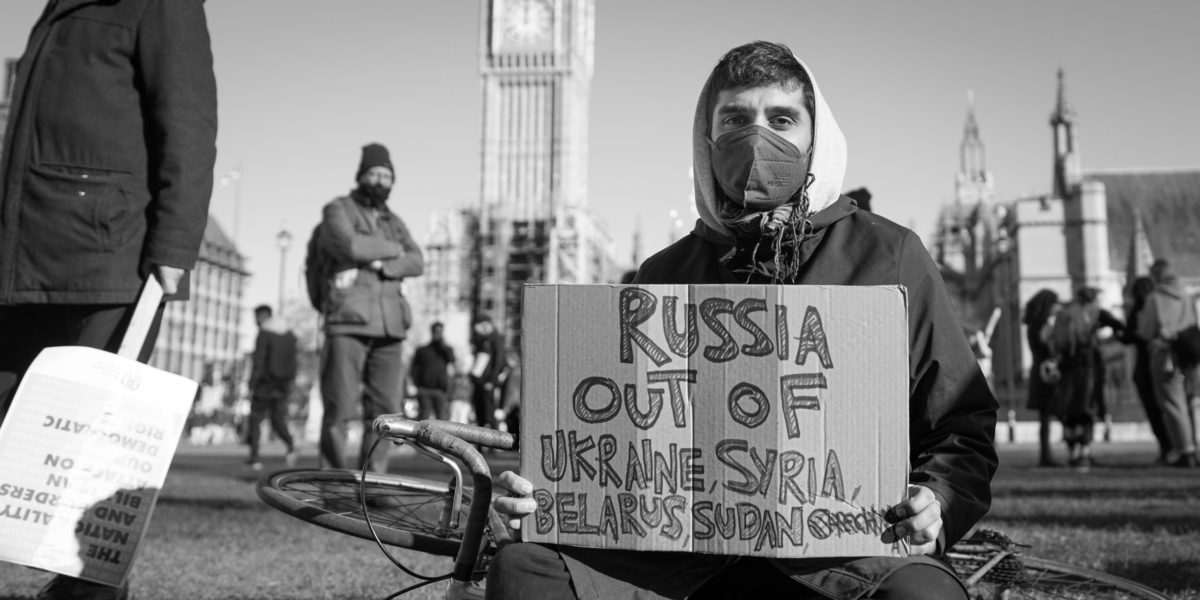What’s Canada’s position on its citizens joining the fight against Russia in Ukraine?
Vague, confusing, and, I think, purposely ambiguous.
When asked about Canadians traveling to fight the Russian invasion, Defence Minister Anita Anand’s initial reaction was: “Of course, we understand Canadians’ desire to join our Ukrainian friends to fight.” Yet almost a week later, her office said: “Canadians should continue to avoid all travel to Ukraine, and those in Ukraine should leave if it is safe for them to do so.”
Commenting on the same topic, Melanie Joly, Minister of Foreign Affairs, emphasized freedom of choice, claiming fighters traveling to Ukraine are making ‘an individual decision.’ The Ministers’ comments do not acknowledge the reality on the ground in Kyiv; according to the International Legion for the Territorial Defence of Ukraine, 550 Canadians were already in Ukraine for the purpose to fight.
Federal ministers were clear that joining the Russian military effort is illegal and Canadians planning to join the Russian side will face consequences. Chrystia Freeland, the deputy Prime Minister and Minister of Finance, said: “We are very clear that this war is illegal. And Canada will take a very appropriately severe view of anyone who is fighting this war.” When asked about bearing arms for the Ukrainian side, the confidence about the legalities of the matter seemed to wane.
I completely agree with Freeland: this is an illegal war. So the Canadian response to such illegality should be to avoid joining a side, and instead accept refugees and push for de-escalation and negotiations for peace. We cannot on one hand, turn a blind eye on those who are fighting with Ukraine and on the other hand warn prosecution on those traveling to fight for Russia.
This double standard will not position Canada as an honest and trustworthy international peace broker.
But this is not new, several times throughout its history, Canada adopted ambiguous and hypocritical positions in international conflicts that left some of its own citizens demonized, trapped, and prosecuted.
Canada’s legacy in the Spanish Civil War (1936-1939)
Republicans, who aspired to build a new Spain based on socialist principles, fought against the Nationalists, who were supported by some European fascist powers. The Canadian government decided to remain neutral, but slowly and quietly aligned with the Nationalist camp because they did not want to encourage any domestic communist euphoria. It was estimated between 1500 to 1700 Canadians traveled, without the permission of their government, fought, and died in this war.
Dr. Norman Bethune, a prominent figure in Canadian history, was one of those fighters. He later died in China, was eulogized by Mao Zedong, and become a national Chinese hero.
After their return to Canada, those who fought during the Spanish Civil war were prosecuted under the then-newly established Foreign Enlistment Act. And because most of them were affiliated with the Communist Party of Canada, they were investigated by the RCMP
A more recent example: the Syrian civil war
When the war in Syria broke out in 2011, many Canadians wanted to join the rebel forces to fight Bashar Al Assad’s regime. He was ruthlessly killing his own people with military support from Russia.
Not all of the young Muslim men and women who travelled to Syria joined ISIS and became fighters. Many young Canadians naively believed their presence would make a difference. They believed they were helping their fellow Muslim ‘brothers and sisters’ in a war-torn country.
Unfortunately, many of them ended up in ISIS-controlled areas and found themselves either killed or imprisoned. Currently there are about 47 Canadians detained in prison in camps Al-Roj and Al-Hol in Northern Syria, under the control of Kurdish forces. Many of them are women and children in desperate need of repatriation.
But the Canadian government declared travelling to Syria to join extremist groups as criminal in 2015. All those who tried, successfully or not, to go to Syria were declared terrorists. This is why they are still trapped today.
Canada accepted 40,000 Syrians refugees fleeing the war, but the same government passed anti-terrorism legislation that allowed the preventive detention of individuals who seem to have the intention of committing terrorist activities or joining violent groups. Many young Canadian men ended up serving prison sentences ranging from six to seven years without ever stepping foot in Syria.
Political ambiguity allows room for Canadians to become foreign fighters
Minister Anand, said, about Canadians who want to fight for Ukraine: “The legalities of the situation … are indeterminant at this time.” Would that mean, that in the near future once the legalities of the situation will be demystified, Canadian fighters can travel to fight for one side but not the other? Will those who plan to fight for Russia face prosecution?
Political leaders’ uncertainty and media interpretations send a confusing message especially to young Canadians, who may see that as a green light to travel overseas and risk their lives. This is a real possibility – those drawn by a sense of military adventure and even by the call of religious or ideological beliefs; the strong and violent presence of neo-Nazi and fascist groups in Ukrainian is well documented.
Foreign wars that Canada is not directly involved in, are a theaters where Canadian fighters can travel aboard and play out their views and ideals. It is dangerous for the government to play politics within that fragile dynamic.
Canadian journalist, Michel Petrou, writes in his book Renegades: “It was [the Spanish Civil War] almost like a screen on which people could project their aspirations and their hopes and the ideological battles they were fighting out.”
It is a mistake for the Canadian government to play ideological battles, drawing hard lines of friend and enemy. It is the lives of Canadians that matter. An unequivocal statement of the illegality of joining either side is the right course of action, not hailing some foreign fighters as heroes while those who were called terrorists are still trapped in limbo.



